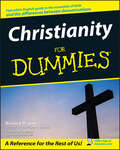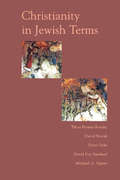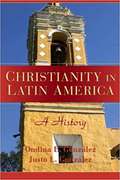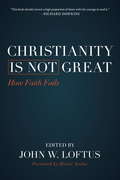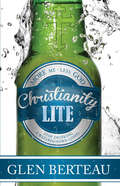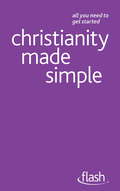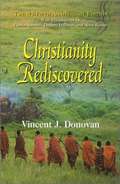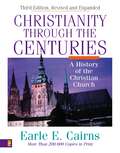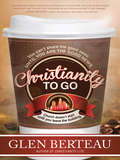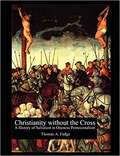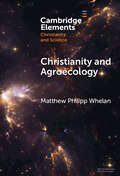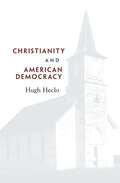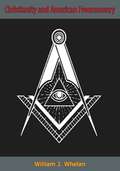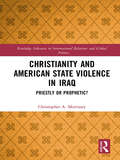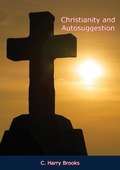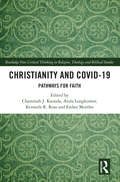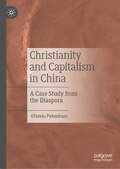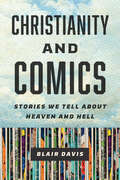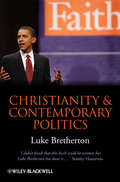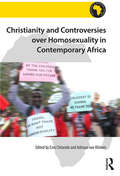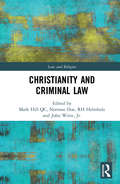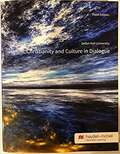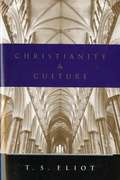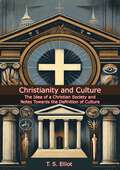- Table View
- List View
Christianity For Dummies (For Dummies Ser.)
by Richard WagnerGet to know the beliefs and practices inspired by Jesus Christ Discover what it means to be a Christian and follow the gospel Curious about Christianity? This friendly guide helps you understand the basic teachings of the Christian faith, exploring the common ground that all Christians share, the differences among the major branches, the key events in Christian history, the key theological issues, and the many ways Christians live out their faith in today's world. The Dummies Way * Explanations in plain English * "Get in, get out" information * Icons and other navigational aids * Tear-out cheat sheet * Top ten lists * A dash of humor and fun Discover how to: * Express the core essentials of Christianity * Appreciate the life and teachings of Jesus * Understand why the Bible is central to the faith * Respect the unique roles of the Trinity * Explore controversial issues among the branches
Christianity In Jewish Terms
by Tikva Frymer-Kensky David Novak Peter Ochs Michael Singer David SandmelOver the past few decades, there has been a dramatic and unprecedented shift in Jewish-Christian relations, including signs of a new, improved Christian attitude towards Jews. Christianity in Jewish Terms is a Jewish theological response to the profound changes that have taken place in Christian thought. The book is divided into ten chapters, each of which features a main essay, written by a Jewish scholar, that explores the meaning of a set of Christian beliefs. Following the essay are responses from a second Jewish scholar and a Christian scholar. Designed to generate new conversations within the American Jewish community and between the Jewish and Christian communities, Christianity in Jewish Terms lays the foundation for better understanding. It was named a Choice Outstanding Academic Book of 2001.
Christianity In Latin America: A History
by Justo L. González Ondina E. GonzálezChristianity has had an undeniable impact on Latin America, which has in turn transformed Christianity itself. Focusing on this mutually constitutive relationship, Christianity in Latin America presents the important encounters between people, ideas, and events of this large, heterogeneous subject. This book offers an accessible and engaging review of the history of Christianity in Latin America with a widely ecumenical focus to foster understanding of the various forces shaping both Christianity and the region.
Christianity Is Not Great
by Hector Avalos John W. LoftusIn this new anthology critiquing Christianity, John Loftus--a former minister and now a leading atheist--has brought together an outstanding group of respected scholars who focus on the harms caused by the world's leading religion. The contributors begin by dissecting the many problematic aspects of religious faith generally. They repeatedly demonstrate that, with faith as a foundation, almost anything can be believed or denied. And almost any horrific deed can be committed. The authors then take a good hard look at many of the most important political, institutional, scientific, social, and moral harms committed in the name of Christianity. These range from the historical persecutions of the Inquisition and witch hunts to the current health hazards of faith healing.Finally, the authors answer three common Christian retorts to criticisms from nonbelievers: (1) that atheists cannot judge a harmful action without an objective moral standard; (2) that atheists need faith to solve the world's problems; and (3) that atheists cannot live a good life without faith.Loftus and the contributors generally conclude that, given both the well-documented historical record and ongoing problems raised by the faith, Christianity decisively fails empirical tests of its usefulness to humanity.
Christianity Lite: Stop Drinking a Watered-Down Gospel
by Glen BerteauWe need more than a diluted, decaffeinated faith. We need the real thing. Almost every food and beverage today also has a “lite” version--potato chips, whipped cream, maple syrup, soda, beer... You may even remember an ad campaign for a light beer a few years back, “Tastes great. Less filling.” Many of us have taken that same attitude--sometimes even without realizing it--and applied it to our faith. We want blessings, but without obedience. Comfort, but without sacrifice. Happiness, but without repentance. As a result, we have watered down, decaffeinated, and diluted the message of the gospel until it really has no effect on our lives or the lives of others. In Christianity Lite Glen Berteau calls us back to the full gospel message: Jesus didn’t come to make our normal, selfish, sinful lives a little better. He came to radically transform life as we know it. This narrow way, the way of grace-inspired obedience, is the only way to find the real Jesus, real meaning, real hope, and a life where we’ll really live!
Christianity Made Simple: Flash
by John YoungThe books in this bite-sized new series contain no complicated techniques or tricky materials, making them ideal for the busy, the time-pressured or the merely curious. Christianity Made Simple is a short and to-the-point guide to Christianity. In just 96 pages, the reader will learn all about the history, beliefs and traditions of this major world faith. Ideal for the busy, the time-pressured or the merely curious, Christianity Made Simple is a quick, no-effort way to break into this fascinating topic.
Christianity Made Simple: Flash
by John YoungThe books in this bite-sized new series contain no complicated techniques or tricky materials, making them ideal for the busy, the time-pressured or the merely curious. Christianity Made Simple is a short and to-the-point guide to Christianity. In just 96 pages, the reader will learn all about the history, beliefs and traditions of this major world faith. Ideal for the busy, the time-pressured or the merely curious, Christianity Made Simple is a quick, no-effort way to break into this fascinating topic.
Christianity Rediscovered
by Vincent J. DonovanTwenty-Fifth Anniversary Edition With interpretive essays by Lamin Sanneh and Eugene Hillman and a personal reflection by Donovan's sister, Nora Koren. An Orbis classic brought up to date with insightful contributions by two scholars and the sister who knew the author best. For twenty-five years, Vincent J. Donovan's epistle from the Masai has inspired countless readers by telling the story of what happened when he, an American Spiritan missioner working among the Masai, began listening to how they were interpreting the Gospel in their own terms. Donovan's work has become a bible for men and women seeking to move beyond colonial missionary relations with Africans, revealing both the creativity and humanity of the Masai in a way no other book has ever done. In this silver anniversary edition, Lamin Sanneh, the noted Yale professor of history and author, locates the Masai people in history, culture, and land in the broader context of East African history and offers a brilliant interpretation of how and why Christianity Rediscovered is so important.
Christianity Through the Centuries: A History of the Christian Church
by Earle E. CairnsThe third edition of Christianity Through the Centuries brings the reader up-to-date by discussing events and developments in the church into the 1990s. This edition has been redesigned with new typography and greatly improved graphics to increase clarity, accessibility, and usefulness. - New chapters examine recent trends and developments (expanding the last section from 2 chapters to 5) - New photos. Over 100 photos in all -- more than twice the number in the previous edition - Single-column format for greater readability and a contemporary look - Improved maps (21) and charts (39) Building on the features that have made Christianity Through the Centuries an indispensable text, the author not only explains the development of doctrines, movements, and institutions, but also gives attention to "the impact of Christianity on its times and to the mark of the times on Christianity."
Christianity To Go: You Can't Share the Good News Until You Are the Good News. Church Doesn't Start Until You Leave the Building.
by Glen BerteauTaking the beauty of Jesus out of our church buildings and into the world Church buildings are important. They give us a place where we can gather, but ultimately they’re just buildings. They’re not the real church. We are. Our impact shouldn’t end when we walk out the doors of the church. That is the moment that it should begin. Christianity to Go shows you how to let God transform your life into something so beautiful you can’t help but attract people, inspiring you to go out into the world and shine. God wants to point to us and say, “Look what I’ve done with him, with her, and with them! I’ve restored them. No, they aren’t perfect yet, but someday they will be. Look at their beauty! I’m so proud they’re Mine!” Jesus makes us beautiful by clothing us with love, joy, and spiritual strength. Get up and leave the building. People are waiting for you to show them your beauty because your beauty points them to Jesus.
Christianity Without the Cross: A History of Salvation in Oneness Pentecostalism
by Thomas A. FudgeA study of the doctrine of salvation in the United Pentecostal Church and its immediate historical antecedents with a focus on the Pentecostal Church, Incorporated and prominent ministers such as Goss, Greer, Yadon, Gurley, Jacques, Stairs, Wickens and Paterson.
Christianity and Agroecology (Elements of Christianity and Science)
by Matthew Philipp WhelanThis Element draws on the transdisciplinary field of agroecology to clarify and deepen Catholic social teaching's natural law ethic. In response to the ecological crisis, social teaching has begun to appeal to ecology and the exemplarity of natural ecosystems to foster care of creation. Some have criticized this natural law ethic, along with its invocations of balance and harmony, as overly idealized, advocating instead for an alternative view in which ecological dynamism and ambiguity preclude appeals to ecology for guidance. While sympathizing with these criticisms, this Element offers a different way forward, contending that social teaching's natural law ethic should be revised rather than abandoned. Agroecology displays an approach to tilling and keeping the earth that accommodates dynamism and ambiguity, while also discerning ecological principles and processes that are mimicked agriculturally. In short, this Element argues that engaging agroecology can help social teaching clarify, concretize, and deepen its understanding of natural law.
Christianity and American Democracy (The Alexis de Tocqueville Lectures on American Politics #2)
by Hugh HecloExploring the tension at the heart of America’s culture wars, this is “a very fine book on a very important subject” (Mark A. Noll, author of The Civil War as a Theological Crisis).Christianity, not religion in general, has been important for American democracy. With this bold thesis, Hugh Heclo offers a panoramic view of how Christianity and democracy have shaped each other.Heclo shows that amid deeply felt religious differences, a Protestant colonial society gradually convinced itself of the truly Christian reasons for, as well as the enlightened political advantages of, religious liberty. By the mid-twentieth century, American democracy and Christianity appeared locked in a mutual embrace. But it was a problematic union vulnerable to fundamental challenge in the Sixties. Despite the subsequent rise of the religious right and glib talk of a conservative Republican theocracy, Heclo sees a longer-term, reciprocal estrangement between Christianity and American democracy.Responding to his challenging argument, Mary Jo Bane, Michael Kazin, and Alan Wolfe criticize, qualify, and amend it. Heclo’s rejoinder suggests why both secularists and Christians should worry about a coming rupture between the Christian and democratic faiths. The result is a lively debate about a momentous tension in American public life.
Christianity and American Freemasonry
by William J. WhelanWhat is it about Freemasonry that would cause Churches to forbid or openly discourage seventy million Americans from membership? Why have eight popes condemned the Lodge?This book, which was first published in 1958 and the first full-length treatment of this subject by an American Catholic in 50 years, was written by William J. Whelan to explain why the Church has warned her sons against affiliating with the Masonic lodge since 1738.
Christianity and American State Violence in Iraq: Priestly or Prophetic? (Routledge Advances in International Relations and Global Politics)
by Christopher A. MorrisseyThe world continues to be threatened by non-state, religiously-rationalized violence. While some fail to the see the connections between the United States’ intervention in the Middle East and this ongoing threat, the non-state perpetrators of terror consistently identify American meddling as one of their principle motivating grievances. What are the social and cultural roots of different religious positions on the war in Iraq? Christianity and American State Violence in Iraq returns to a critical moment in U.S. foreign policy, during which American Christians publicly debated war in Iraq. It examines the religious precepts that were used to argue both for and against the United States’ military engagement in Iraq. To capture this behavior, Christopher A. Morrissey delves into the distinct social and cultural origins of both war-supporting and war-challenging positions. His analysis represents an improved understanding of the public role of religion in important foreign policy debates and helps us better understand how religious culture can legitimate or challenge state violence. An original and timely resource on the social sources of religion’s ambivalence towards violence and peace in the US and abroad.
Christianity and Autosuggestion
by C. Brooks Ernest CharlesÉmile Coué de la Châtaigneraie (1857-1926) was a French psychologist and pharmacist who introduced a popular method of psychotherapy and self-improvement based on optimistic autosuggestion.“THE distinctive feature of M. Coué’s method, compared with other popular methods of self-healing, lies in the fact that it reposes on purely psychological bases. This is its value. We may be reproached with robbing it, in this book, of its psychological foundation and confusing its clarity with mystical speculation. But this is not so. The value of M. Coué’s psychological doctrine and of his technical method is in no sense denied or depreciated in these pages. We compare and contrast his teaching with the teaching of Christ on cognate subjects. Finding between them an essential harmony, we attempt to place autosuggestion in its true position in Christian life and thought, and to utilise the Christian dynamic for extending and deepening its power. The secular practice of autosuggestion continues unaltered, but side by side with it we attempt to erect, in essential outlines, a Christian practice of autosuggestion.”—C. Harry Brooks
Christianity and COVID-19: Pathways for Faith (Routledge New Critical Thinking in Religion, Theology and Biblical Studies)
by Chammah J. Kaunda, Atola Longkumer, Kenneth R. Ross and Esther MomboThis volume explores current understandings of the global meaning of faith and suffering in the context of COVID-19 and interrogates responses to the pandemic that have emerged from World Christianity. It includes chapters by a range of international contributors approached from a variety of angles within Global Christian theology. They provide reflections and analyses focused on the question of God, human suffering, structural injustice, the role of the church and Christian praxis in the milieu of COVID-19, where misery and dying is a daily routine. This book will be of interest to scholars of Missiology, World Christianity, biblical/public/contextual theology and various Contemporary Christian studies.
Christianity and Capitalism in China: A Case Study from the Diaspora
by Ottavio PalombaroThis book links Calvinist belief in the Perpetual Assurance of Salvation with self-efficacy for economic success. Certain values are at stake for the success of economic behavior. Since the genesis of modern capitalism, a set of beliefs proper of Calvinism (mainly Predestination but also Beruf, Inner-worldly Asceticism, role of Sects…) was said by Max Weber to cause an anxiety about salvation and generate a propensity to economic success as a sign of election. In order to observe this in action today, it is crucial to consider the evolution that the Protestant ethic went through migrating first in north America and lastly through the Protestant revival of China. Wenzhou is called ‘Jerusalem of China’ for its large Protestant community that is also strongly involved in business. Some scholar already pointed out the presence among those entrepreneurs of this Protestant ethic (Yi Xiang, Boss-Christian…). The data presented in this comparative qualitative study pertain to ethnographic observations, job-shadowing and interviews done among Chinese Christian and non-Christian entrepreneurs from Wenzhou living in Milan, Italy. The results show with some adjustments the presence of a Chinese-version of the Protestant ethic overlapping with several values proper to the Chinese context (Confucianism, lineage, social network). The extension of the study to other cases must be done with caution considering the non-causal justificatory role of the belief. Regardless: successful entrepreneurship involves specific social, cultural and even religious aspects that move beyond mere business strategies.
Christianity and Comics: Stories We Tell about Heaven and Hell
by Blair DavisThe Bible has inspired Western art and literature for centuries, so it is no surprise that Christian iconography, characters, and stories have also appeared in many comic books. Yet the sheer stylistic range of these comics is stunning. They include books from Christian publishers, as well as underground comix with religious themes and a vast array of DC, Marvel, and Dark Horse titles, from Hellboy to Preacher. Christianity and Comics presents an 80-year history of the various ways that the comics industry has drawn from biblical source material. It explores how some publishers specifically targeted Christian audiences with titles like Catholic Comics, books featuring heroic versions of Oral Roberts and Billy Graham, and special religious-themed editions of Archie. But it also considers how popular mainstream comics like Daredevil, The Sandman, Ghost Rider, and Batman are infused with Christian themes and imagery. Comics scholar Blair Davis pays special attention to how the medium’s unique use of panels, word balloons, captions, and serialized storytelling have provided vehicles for telling familiar biblical tales in new ways. Spanning the Golden Age of comics to the present day, this book charts how comics have both reflected and influenced Americans’ changing attitudes towards religion.
Christianity and Contemporary Politics
by Luke BrethertonCongratulations to Luke Bretherton on winning the 2013 Michael Ramsey Prize for Theological Writing for Christianity and Contemporary Politics!Relations between religious and political spheres continue to stir passionate debates on both sides of the Atlantic. Through a combination of theological reflection and empirical case studies, Bretherton succeeds in offering timely and invaluable insights into these crucial issues facing 21st century societies. Explores the relationship between Christianity and contemporary politics through case studies of faith-based organizations, Christian political activism and welfare provision in the West; these case studies assess initiatives including community organizing, fair trade, and the sanctuary movementOffers an insightful, informative account of how Christians can engage politically in a multi-faith, liberal democracyIntegrates debates in political theology with inter-disciplinary analysis of policy and practice regarding religious social, political and economic engagement in the USA, UK, and continental EuropeReveals how Christians can help prevent the subversion of the church - and even of politics itself - by legal, bureaucratic, and market mechanisms, rather than advocating withdrawal or assimilationEngages with the intricacies of contemporary politics whilst integrating systematic and historical theological reflection on political and economic life
Christianity and Controversies over Homosexuality in Contemporary Africa (Religion in Modern Africa)
by Ezra Chitando and Adriaan van KlinkenIssues of homosexuality are the subject of public and political controversy in many African societies today. Frequently, these controversies receive widespread attention both locally and globally, such as with the Anti-Homosexuality Bill in Uganda. In the international media, these cases tend to be presented as revealing a deeply-rooted homophobia in Africa fuelled by religious and cultural traditions. But so far little energy is expended in understanding these controversies in all their complexity and the critical role religion plays in them. Complementing the companion volume, Public Religion and the Politics of Homosexuality in Africa, this book investigates Christian politics and discourses on homosexuality in sub-Saharan Africa. The contributors present case studies from various African countries, from Nigeria to South Africa and from Cameroon to Uganda, focusing on Pentecostal, Catholic and mainline Protestant churches. They critically examine popular Christian theologies that perpetuate homophobia and discrimination, but they also discuss contestations of such discourses and emerging alternative Christian perspectives that contribute to the recognition of sexual diversity, social justice and human rights in contemporary Africa.
Christianity and Criminal Law (Law and Religion)
by John Witte Jr Norman Doe Mark Hill Qc Rh HelmholzThis collection, by leading legal scholars, judges and practitioners, together with theologians and church historians, presents historical, theological, philosophical and legal perspectives on Christianity and criminal law. Following a Preface by Lord Judge, formerly Lord Chief Justice of England and Wales, and an introductory chapter, the book is divided into four thematic sections. Part I addresses the historical contributions of Christianity to criminal law drawing on biblical sources, early church fathers and canonists, as far as the Enlightenment. Part II, titled Christianity and the principles of criminal law, compares crime and sin, examines concepts of mens rea and intention, and considers the virtue of due process within criminal justice. Part III looks at Christianity and criminal offences, considering their Christian origins and continuing relevance for several basic crimes that every legal system prohibits. Finally, in Part IV, the authors consider Christianity and the enforcement of criminal law, looking at defences, punishment and forgiveness. The book will be an invaluable resource for students and academics working in the areas of Law and Religion, Legal Philosophy and Theology.
Christianity and Culture in Dialogue
by Seton Hall UniversityChristianity and Culture in Dialogue (Third Edition)
Christianity and Culture: The Idea of a Christian Society and Notes Towards the Definition of Culture
by T. S. EliotTwo long essays: "The Idea of a Christian Society" on the direction of religious thought toward criticism of political and economic systems; and "Notes towards the Definition of Culture" on culture, its meaning, and the dangers threatening the legacy of the Western world.
Christianity and Culture: The Idea of a Christian Society and Notes Towards the Definition of Culture
by T. S. ElliotChristianity and Culture by T. S. Eliot is a profound and thought-provoking exploration of the relationship between religion, society, and cultural identity. This volume brings together two of Eliot’s influential essays, The Idea of a Christian Society and Notes Towards the Definition of Culture, offering readers an insightful examination of how faith shapes the moral and intellectual fabric of civilization.In The Idea of a Christian Society, Eliot argues that a society grounded in Christian principles fosters justice, community, and a shared sense of purpose. He reflects on the moral decay that can result from secularism and materialism, contending that cultural renewal requires the influence of faith in both personal and public life. For Eliot, Christianity offers not just spiritual salvation but also a framework for building a society where human flourishing is guided by moral truth and collective responsibility.In Notes Towards the Definition of Culture, Eliot delves into the meaning and purpose of culture, considering how religious belief, education, and tradition are interwoven with cultural development. He emphasizes the importance of preserving cultural heritage and reflects on the role of Christianity in maintaining social coherence. Eliot also discusses the need for intellectual humility and openness to transcendence in the face of modern challenges.Together, these essays offer a compelling vision of culture as inseparable from religious values, inviting readers to reflect on the interplay between faith, tradition, and the common good. Christianity and Culture is essential reading for those interested in philosophy, theology, or cultural studies, offering timeless insights into how Christian belief can inform both individual lives and the broader society. Eliot’s work challenges modern readers to reconsider the role of faith in shaping not only personal values but also the cultural and moral direction of society.
